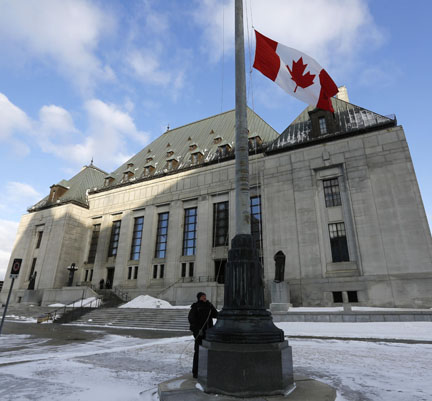This week, the Supreme Court of Canada will hear five appeals including a number of significant cases that will determine the rights of the Crown to “take up” Aboriginal lands under treaty; the right of public-sector workers in Saskatchewan to strike; and the extent of solicitor-client privilege as it pertains to money laundering laws.
 May 12
May 12 — New Brunswick —
Potter v. New Brunswick Legal Aid Services CommissionEmployment law: David Potter was named the executive director of New Brunswick Legal Aid Services Commission in 2006. Within a few years, Potter’s relationship with the board of directors there had deteriorated. In January 2010, the board suspended Potter with pay for an indefinite period. Potter, claiming constructive dismissal, filed suit against the commission. The commission then terminated his pay and benefits, claiming that the legal action was tantamount to a resignation. Both the trial judge and the court of appeal sided with the commission.
Read the New Brunswick Court of Appeal’s
decisionRelated coverage:
Should a claim for constructive dismissal amount to a resignation? Labour Law BlogMay 13 — British Columbia —
Canada v. Federation of Law SocietiesSolicitor-client privilege: The Federation of Law Societies of Canada petitioned the British Columbia Supreme Court for a declaration that certain provisions of the Proceeds of Crime (Money Laundering) and Terrorist Financing Act are unconstitutional in that they infringe on solicitor-client privilege and undermine the independence of the bar granted under the Charter. The legislation requires lawyers and notaries to record details of financial transactions, which can be accessed by law enforcement officials. The B.C. Supreme Court ruled the legislation constitutional, but was overturned on appeal.
Read the British Columbia Court of Appeal’s
decisionRelated news story:
SCC to hear lawyers’ privilege argument over money laundering law,
Legal Feeds
May 14 — Federal —
Canadian Artists’ Representation v. National Gallery of CanadaCopyright: The applicants represent visual artists in Canada. Since 2003, they have conducted negotiations with the National Gallery that included minimum fees for use of existing copyright works. In 2007, the National Gallery received a legal opinion it could stop discussing copyright with the applicants and removed all mention of minimum fees from agreements. The applicants filed a complaint with the Canadian Artists and Producers Professional Relations Tribunal, which sided with the applicant. The Federal Court of Appeal set aside the tribunal’s decision and allowed the artists’ application for judicial review.
Read the Federal Court of Appeal’s
decisionRelated news story:
Artists groups free to take gallery fee dispute to Supreme Court,
The Globe and MailMay 15 — Ontario —
Keewatin v. CanadaAboriginal law: In 2005, the Grassy Narrows First Nation launched an action against Ontario after it issued a licence enabling Abitibi-Consolidated Inc. to clear-cut an area of land. The land in question falls under the 1873 Ojibway Treaty 3, which contains a “harvesting clause” that gives Grassy Narrows rights to hunt and fish, except on land “required or taken up [by Canada] for . . . lumbering or other purposes.” The First Nation claims the licence interferes with its own harvesting rights. The SCC will review whether Ontario has the authority to “take up” the lands under the treaty.
Read the Ontario Court of Appeal’s
decisionMay 16 — Saskatchewan —
Saskatchewan Federation of Labour v. CanadaCharter of Rights and Freedoms: In 2008, Saskatchewan enacted the Public Service Essential Services Act and the Trade Union Amendment Act. The former would limit the ability of public-sector unions to strike, while the latter makes it more difficult for unions to obtain certification. The Saskatchewan Federation of Labour and numerous unions are challenging these pieces of legislation, asserting a violation of freedom of association and expression under the Charter.
Read the Saskatchewan Court of Appeal’s
decisionRelated news story:
Supreme Court to hear Sask. labour law challenge, CTV

 May 12 — New Brunswick — Potter v. New Brunswick Legal Aid Services Commission
May 12 — New Brunswick — Potter v. New Brunswick Legal Aid Services Commission